The following is a list of events that may be of interest to CQ students, fellows, and instructors. This list is organized by the posting date with the most recent first. Postings do not imply any endorsement from CQ.
Calls for Papers
The Golden Oldies: The Radical Potential of Pleasure for Creating a Counter-Narrative on Leisure and Physical Activity in Later Life
Across popular and scholarly discourse, there is at best a disregard and as often a disavowal of pleasure in late and later life. It seems that neoliberal pressures on the old to age well see numerous actors presenting later-life leisure and physical activity as instrumental, used solely in the service of thwarting age-related decline. They frequently emphasise the physical and mental health benefits of “busy bodies” (Katz, 2005) and reproduce normative tropes of older adults as lacking in ability, health, and activity, while also reproducing hierarchies of “good” and “bad” leisure (e.g. active and successful vs. passive and problematic). These attitudes reflect a commitment to neo-liberal healthy ageing scripts that disregard structured inequalities across the life course and the importance of pleasure for human flourishing.
While scholarship on pleasure, leisure, and physical activity in later life exists, it is limited and marginal, with pleasure being at best an accidental and incidental finding, and at worst a distraction or disruption to instrumental efforts to use leisure and physical activity for self-care and governing of ageing populations. Building on critical ageing scholarship that underscores how pleasure can be an important tool for rethinking and resisting neoliberal ageing strategies (Allain, 2020; Kontos et al, 2021;Liddle, Parkinson, Sibritt, 2013; Phoenix & Orr, 2014; Swinnen & de Mederois, 2018; Throsby, 2013), this special issue will consider what knowledge would be gained, and how can scholarship on leisure and physical activity in later life be broadened when scholars center and attend to the intrinsic value of pleasure, or pleasure for pleasure’s sake?
Despite our interest in pleasure, this special edition distinguishes itself from therapeutic work that looks to find ways to make populations happier, especially those working in the service of neoliberal agenda. Instead, we are interested in all forms of pleasure in later life, including sensual (pertaining to one’s senses), documented (arising from keeping track of one’s activities), habitual (generated through the act of regular participation), and immersive (produced through focus that provides escape from one’s everyday lives) (Phoenix & Orr, 2014). And we define leisure broadly to be inclusive of both ‘traditional’ and non-traditional activities and practices of older adults, including their engagement in solitary and social activities, crafting, sports, culture and arts, gambling, volunteering, traveling, sex, and digital technologies.
We encourage contributions from researchers from across all disciplines in the humanities and social sciences to propose papers that focus on pleasure or one or more of the following related concepts, including, but not limited to:
- play/playfulness/fun
- creativity and curiosity
- happiness, satisfaction
- everyday and mundane joy
We encourage papers that foreground intersectional and interdisciplinary perspectives on leisure and/or physical activity that address:
- Narratives and representations of pleasure and old age/ageing
- Ageing, pleasure and their cultural contexts and discourses
- Theoretical entanglements between the field of ageing and feminist, queer, critical race, crip and disability, digital studies and other fields that have explored the radical potential of pleasure as resistance (e.g. expressions and acts of Black and Queer Joy, desire-based design)
- Social structures, practices, and lived realities of pleasure in later life
- Social, political, economic, and ethical perspectives on ageing and pleasure
Timetable:
- Call posted on journal website: September 2024
- Open for manuscript submissions: Nov 1st, 2024
- Close for manuscript submissions: April 30th, 2025
For questions regarding this call, including to pitch an idea (or share abstract of a potential paper) and/or their fit with this special issue, please contact Dr. Kristi Allain (kallain@stu.ca)
For more details, read the complete announcement.
The 41st Annual Qualitative Analysis Conference: The Temporality of Lived Experience and Everyday Lives
Quebec City, Canada
Hosted by
Wilfrid Laurier University
June 18-20, 2025
Abstract Submission Deadline: October 19, 2024
Wilfrid Laurier University will host the 41st Annual Qualitative Analysis Conference, however we are taking the show on the road! The conference this year will be in Quebec City – its first time in la belle province – at the Delta Hotel by Marriott Quebec. The theme of the conference, The Temporality of Lived Experience and Everyday Lives, celebrates notions of time and space in our work.
When Michael Flaherty first introduced the concept of “time work,” the study of time had remained largely in the realm of philosophical, psychological, and organizational studies (efficiency studies), with a few other notable exceptions. However, attention to temporal issues has been steadily increasing in sociology. In her article about the future directions of symbolic interaction, in 2012, Kathy Charmaz encouraged the sociology of time as the next “horizon” for those interested in social organization. Michael Flaherty brings our attention to the socially-constructed nature of temporal experience, emphasizing the role of agency as people work to manipulate their own, and others’, experiences of time. This year, our theme turns to the temporality of lived experience, spatial worlds, and local worlds.
We are very pleased to announce that our Keynote Speaker for the Qualitatives 2025 is Michael Flaherty, Eckerd College and University of South Florida. Please enjoy his impressive bio on our website: https://www.qualitatives.ca/Speakers.
Keeping the broadly conceived concepts of time and space in mind, we invite a range of theoretical, methodological, and empirical papers on this theme.
As usual, we also welcome abstract submissions from both novice and veteran qualitative researchers on all aspects of interpretive theory and qualitative research, and from a broad range of academic disciplines.
Abstracts, in French or English, can be submitted online at www.qualitatives.ca/submit-abstract. If you have any questions, please contact us at thequalitatives@gmail.com.
Forum: Qualitative Social Research Special Issue “Digital Images and Visual Artifacts in Everyday Life: Changing Media—Changing Uses—Changing Methods”
The spread of digital media has brought about new everyday uses of images and other visual artifacts and is significantly changing social life and social communication. Consequently, face-to-face relationships are medialized, and bodily references are transformed, not least in technical interfaces such as interaction with robots. In digital and especially social media, photographs become a means of expression of personal self-presentation and social self-location. Videos are not only presented to document experiences and events but, in their use on portals such as YouTube or TikTok, also prove to be a way of participating in public discourses against the background of visual media. All this has consequences for the theoretical understanding of the interplay of communication, interaction and action. The challenge of developing adequate concepts in view of new social realities is accompanied by the methodological challenge of designing appropriate social science analyses of these constantly changing and newly emerging phenomena.
The discovery of body-related image phenomena and the invention of artificial image media can be traced back to an early stage in the history of mankind. Their detection, invention and constant further development result in manifold possibilities of not only constituting the self, interpreting facts, varying representations, imagining the improbable, engaging in ideography and providing evidence, but also deceiving oneself and others. It is hardly surprising that images are socially exchanged, are used to mark “identities” or negotiate biographies, prove or enable social relationships and are subject to instrumentalization, commodification and standardization. Nevertheless, images and the diversity of visual artifacts still represent a difficult subject—that is, only incompletely understood by social theory or incompletely integrated into existing social theories.
Regarding contemporary uses of technical visual media, various research questions or even desiderata arise. For example, it is necessary to identify and examine the diverse spheres of life and forms of social action, which in their sociohistorical specificity and form owe much to the use of technical image media. This is followed by questions about the bodily reference of social communication and its changes in different media environments. While processes of personal allocation and mutual interpretation in face-to-face relationships are bound to the whole body, technical media make it possible to participate in interactions only with single and maybe altered bodily means of expression. However, image media are also sometimes constitutive for the virtual creation of social situations. This is the case, for example, when emojis are used to imitate facial expressions with the intention to open up an additional level of social framing for communication or when with profile pictures or avatars virtual body images are integrated into digital interaction situations and thus nonverbal communication instruments are expanded with diverse forms of expression. Are new communicative genres, new types of social action and new forms of organization of social interaction and self-emerging in the use of digital images? What is to be understood by interaction, communication and action under the currently changing conditions? Connected to this is the question of whether new concepts are needed to describe the social use of digital images, concepts that no longer tie the comprehension of the object exclusively to classical concepts but are also able to further develop the latter on an empirical basis.
The diversity of contemporary image media, the complexity of social modes of use and the multitude of social-scientific epistemological interests that are (or can be) ascribed to image phenomena also require fundamental methodological reflections. What is understood by image and visual communication, for example, with regard to the relationship between individual images, image clusters, moving images and other visual artifacts? Which already established methodical-methodological approaches are useful and/or need to be further developed?
With this call for papers, we are asking for contributions in which different, but especially contemporary ways of using digital images and visual artifacts in the social sciences are reflected. Ideally, thematic and methodological aspects should be linked. In other words, the methodological implications resulting from the particularities of the sociohistorical use of media or the respective social-scientific epistemological perspectives should be made clear.
The following topics or the exploration of the following aspects is of particular interest.
Conceptual aspects
- Centration on body images with simultaneous dissolution of boundaries, transformation, and detachment or removal from real existing bodies
- Visual presentation, re-presentation, performance and action (in games, social media, social machines, robotics, etc.)
- Modification of interaction concepts in relation to digital social arenas (relations of copresence versus coreference in virtual spaces, gallery versus front/back stages and respective spectators/publics, mutual image-text and image-image communication, and communities of beholders)
Specific phenomena
- Forms of proving oneself in digital spaces
- Emergence of and dealing with vulnerability and violence in digital spaces
- (Generational and medial) identity norms and formations (e.g., in dating apps or youth cultures)
- Visual biographical construction processes in social media
Methodological aspects
- Single image versus image cluster
- Fixed images versus moving images
- Image-text sequences
- Hermeneutic reconstruction of meaning versus documentary methods versus field analyses with visual/textual grounded theory methodology
- Field ethnography versus a focus on analyses of existing imagery
Publication Process
All abstracts can be submitted in English and/or German. The review process includes the following steps:
- Abstracts of approximately 300-400 words should be submitted by September 15, 2023. They should be sent to the guest editors Roswitha Breckner, Michael R. Müller & Anne Sonnenmoser via digital_images@qualitative-research.net.
- All abstracts will be peer reviewed, with decisions on acceptance made by the guest editors within one month (October 15, 2023).
- In the case of acceptance, authors are requested to send a full paper to the guest editors (digital_images@qualitative-research.net) (January 15, 2024). Please follow the instructions for submitting contributions (https://www.qualitative-research.net/index.php/fqs/submission/checklist).
- All submitted papers will be subject to a double-blind peer-review process.
- The publication of the special issue is planned for September 2024.
2024 - 2025
Critical Approaches to Scholarship in Pain Research
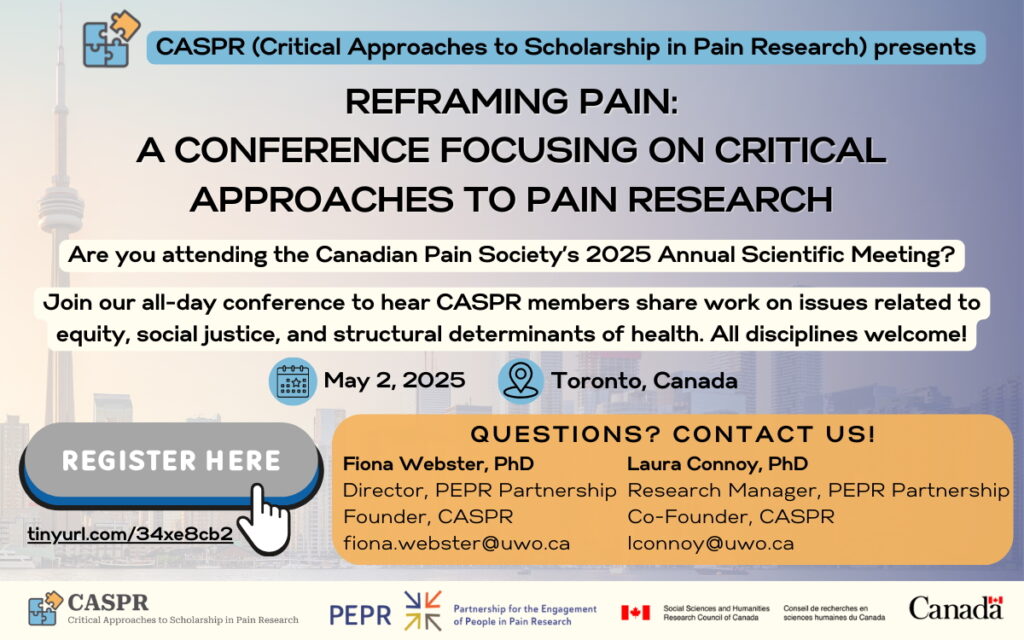
Will you be attending the Canadian Pain Society’s 2025 Annual Scientific Meeting (ASM) in Toronto? Are you interested in learning more about the amazing work being done by critical scholars in the field of chronic pain? If so, be sure to stop by our daylong event that is taking place during the ASM! On May 2, 2025, our stellar lineup of CASPR—standing for Critical Approaches to Scholarship in Pain Research—members will be sharing some of their most recent work on chronic pain as it pertains to structural inequities, interdisciplinarity, the clinical encounter, and the (in)commensurability of pain. A project of the SSHRC funded PEPR Partnership (Partnership for the Engagement of People in Pain Research), CASPR is an international community of practice whose aim is to highlight the work and contributions of critical scholars in the pain space. To learn more about CASPR, please visit: https://criticalpainscholarship.ca/ or https://www.pepr-partnership.org/. Stay tuned to our events pages to follow along with updates and be sure to visit this link to register: https://forms.office.com/r/1w9KWe3EMD. Looking forward to seeing you there!
2023 - 2024
N(ArT)URE Project Exhibit
When Words Are Not Enough: Playing with Art and Nature
The exhibit will showcase the artwork created during a research-creation project by youth, social service providers, artists, and researchers. Through art, our connections with nature, post-human theory, and Indigenous teachings, we re/thought complex relationships between health inequities, wellbeing, and creative spaces.

Music Research-Creation: Speculative Propositions and Transdisciplinary Failures
Public talk with Dr. David Ben Shannon
Tuesday, April 9th, 2024
6:30 – 8:00 pm EDT
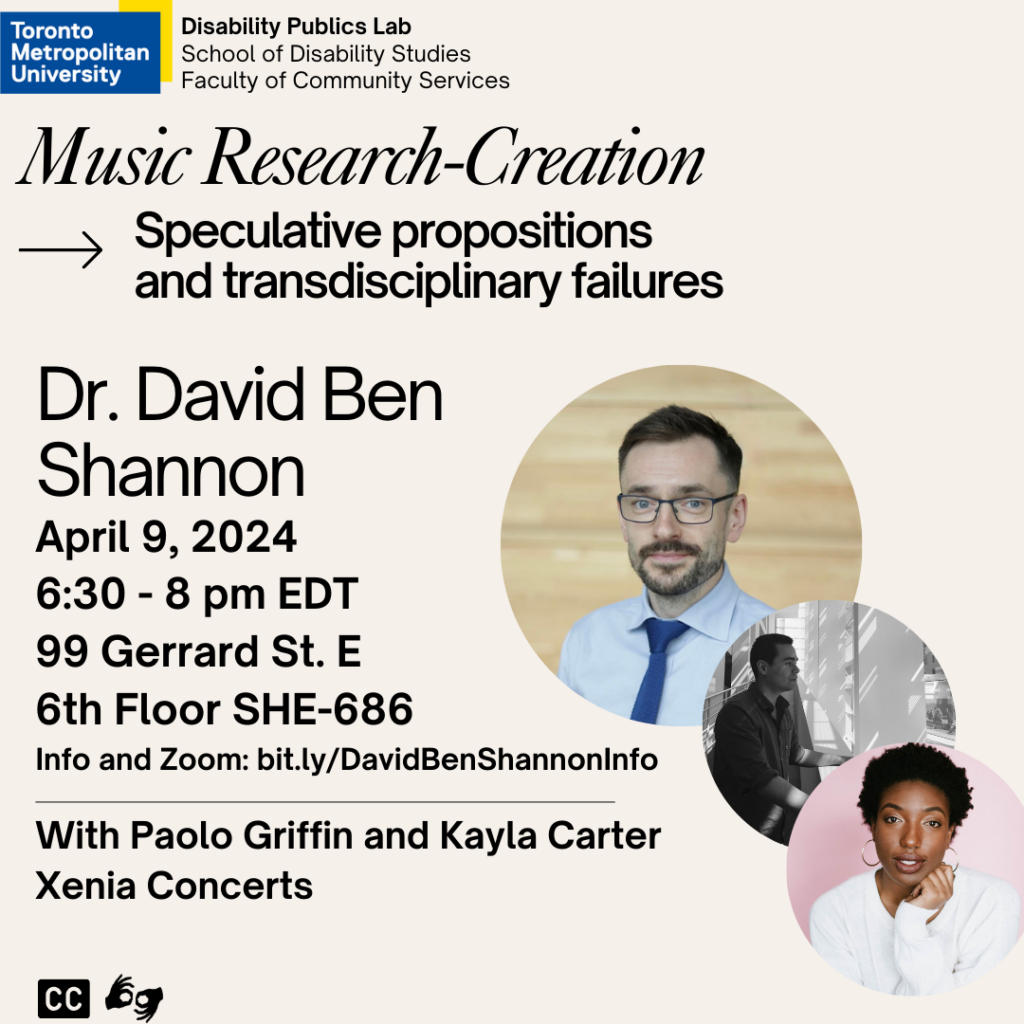
Please join us for the hybrid public talk, “Music Research-Creation: Speculative propositions and transdisciplinary failures” with Dr. David Ben Shannon on April 9th from 6:30-8:00 pm EDT. Dr. Shannon will speak to the methodological potentials and challenges of music composition as a research-creation practice. Research-creation is the feminist curation of practices from across the bounds of multiple disciplines. In his research, Dr. Shannon mobilizes this curation across music composition, empirical social science methods, early years classroom practice, and electrodermal biosensors. Dr. Shannon will discuss the possibilities of conducting transdisciplinary research like this in early childhood settings, but also discuss the various challenges that it presents.
Paolo Griffin and Kayla Carter from Xenia Concerts will be community respondents. Xenia Concerts works with neurodiverse and disabled communities to design, produce, and present exceptional performing arts experiences for children, their families, and others within those communities who face systemic and social barriers to inclusion.
Free and open to the public. Live captioning, virtual ASL interpretation, and attendant care will be provided.
In Person:
Room SHE-686
Sally Horsfall Eaton Building, 6th floor
99 Gerrard St. E.
Toronto Metropolitan University
Info and Zoom: https://bit.ly/DavidBenShannonInfo
For questions and access inquiries please contact: avital.cherniawsky@torontomu.ca
Hosted by the Disability Publics Lab, School of Disability Studies
David Ben Shannon (he/him)
David Ben Shannon is an inter-disciplinary scholar, whose research intersects with critical disability studies, early childhood education, cultural studies, and art. He is a Lecturer (Assistant Professor) in the School of Education, Manchester Metropolitan University, UK. With a background in primary special education, his research interests include neurodiversity, early language, place, and affect. Methodologically, he experiments with sensory ethnography, sound, and research-creation. Dr Shannon is a sound artist and composer, and one-half of glitch-folk, electronica duo Oblique Curiosities.
DavidBenShannon.co.uk | ObliqueCuriosities.com
Paolo Griffin (he/him)
Paolo Griffin is a composer and curator based in Toronto/Tkarón:to whose music has been described as placing “… the listener in a kind of sonic microgravity” (PANM360) and as “…uncompromising and thoroughly engrossing.” (LvT). Paolo’s work involves ongoing research about the sounding and perception of microtonal rational intonation (Just Intonation) combined with a rigorous, process-based approach to sonic form and structure. The work he creates explores the creation of colour/shading/densities in sound, and forms
of action/interactions between processes and systemic organizations. His practice spans sound, performance, text, and improvisation and includes the creation of notated music and text/event scores.
Kayla Carter (she/they)
Kayla Carter (she/they) is a self-described deliberately Black Tkaronto-based educator, multidisciplinary artist, and speaker. Kayla’s work focuses on disability justice, grief, anti-racism, inclusive design, intersectionality, gender, and class. Kayla’s work is rooted in unpacking and analyzing these institutional, cultural, physical, and social structures, and the subsequent material effects on our lives. Known for her passionate, thorough and empathetic delivery, Kayla has facilitated workshops, moderated and been on panels for the University of Toronto, Humber College, Media Girlfriends, Canadian Women’s Foundation, Students for Barrier Free Access, The Social Work Faculty at the Toronto Metropolitan University and has been on Cityline.
Teaching for Transformation: Annual Conference+ (TforT:AC+) 2024
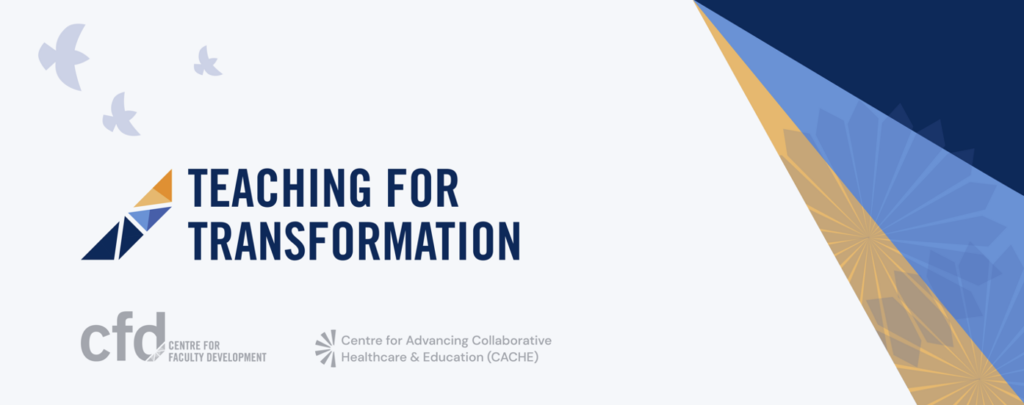
This year’s theme: Teaching toward Collaborative Approaches to Care
SAVE THE DATE! March 25-27, 2024
Teaching for Transformation: Annual Conference+ (TforT:AC+) is a three-day immersion in the education paradigms and practices needed for today’s health care work. The theme for TforT:AC+ 2024 is Teaching toward Collaborative Approaches to Care. TforT:AC+ involves paired dialogic keynote sessions, workshops, short talks (submitted abstracts), dialogic roundtables, and space for open dialogue. TforT:AC+ will take place online, enabling an international reach.
CALL FOR ABSTRACTS
Abstract Submission Deadline: November 15, 2023 at 11:59pm (EST)
Learn more and submit your abstract here.
Early bird discounts and speaker information coming soon!
Please direct any questions related to abstract submission or TforT:AC+ 2024 to info@teachingfortransformation.com.
Teaching for Transformation (TforT) is jointly offered by the Centre for Faculty Development and Centre for Advancing Collaborative Healthcare & Education
Art Exhibition & Film Screening – Reimagining Dementia
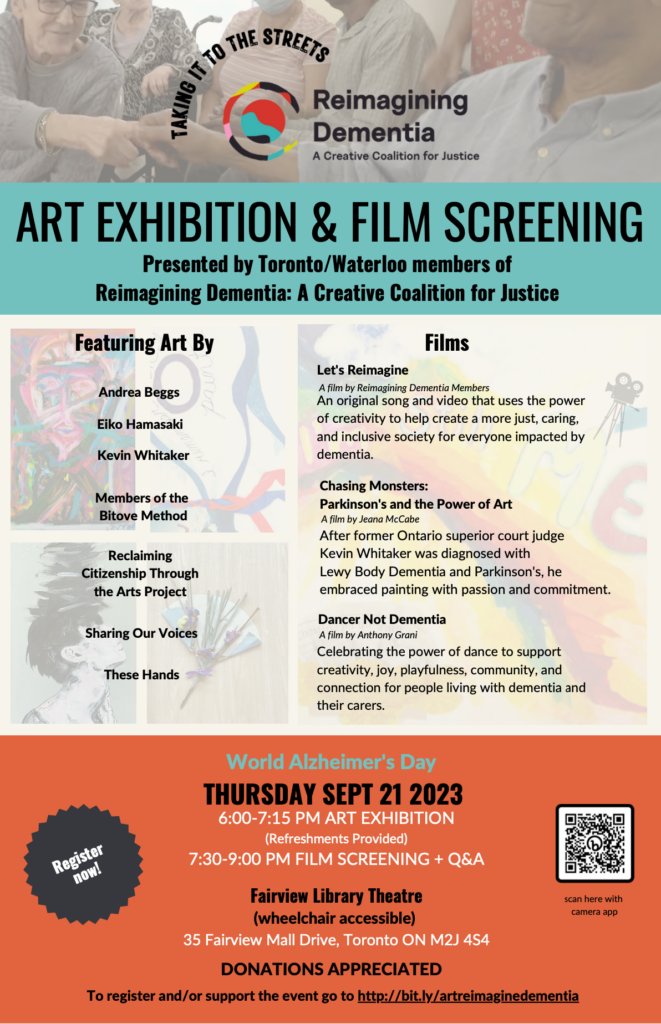
Presented by Toronto/Waterloo members of Reimagining Dementia: A Creative Coalition for Justice
Art by Kevin Whitaker, Andrea Beggs, Members of the Bitove Method, Eiko Hamasaki, Reclaiming Citizenship Through the Arts Project, Sharing Our Voices, and others living with dementia.
Three short films about creativity and dementia:
Let’s Reimagine
A film by members of Reimagining Dementia. An original song and video that uses the power of creativity to help create a more just, caring, and inclusive society for everyone impacted by dementia. View: https://youtu.be/rDTsb7VUZSE
Chasing Monsters: Parkinson’s and the Power of Art
A film by Jeana McCabe. After former Ontario superior court judge Kevin Whitaker was diagnosed with Lewy Body Dementia and Parkinson’s, he embraced painting with passion and commitment. View the trailer: https://www.youtube.com/watch?v=CPUB9JVhMQI
Dancer Not Dementia
A film by Anthony Grani. Celebrating the power of dance to support creativity, joy, playfulness, community, and connection for people living with dementia and their carers. View the trailer: https://youtu.be/feEg6tN0kE4
Register on Eventbrite.
The 13th Biennial Conference of the International Society of Critical Health Psychology
We are pleased to announce that our next Biennial Conference will take place from 26-28 July 2023, in hybrid form (in-person and on-line) at Universidad de O’Higgins in Rancagua, Chile.
You can find all information about the Conference at https://ischp2023.com, including information about the venue, conference themes, keynote speakers, workshops, registration costs, and abstract submission. Abstract submissions for individual papers, symposia, roundtables, posters, pecha kucha, and 5-minute challenge presentations are currently open, with a March 15 deadline for submission. Registrations will open in early March.
ISCHP conferences are friendly, inclusive, and welcoming, and we especially welcome participation from new and emerging researchers. The conference is focused on critical approaches to health, and we welcome submissions from researchers across all health-related disciplines. The conference has a hybrid format, so if you are not able to attend in person, you can participate on-line for many of the conference sessions.
We look forward to seeing you, in Rancagua or online, in July.
ISCHP2023 Organising Committee
Contact: ischp@uoh.cl
In Sickness & In Health Conference
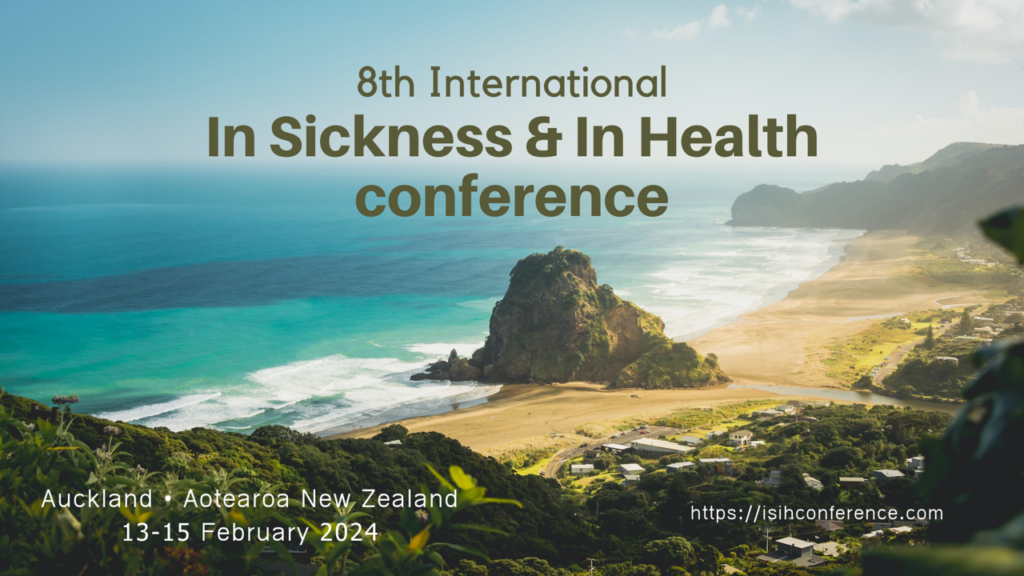
The ISIH Conference is a place where people who work in critical healthcare research, education and practice share their radical, cutting-edge theories and philosophies with a warm, diverse, welcoming community of like-minded thinkers.
At ISIH we celebrate the shock of the new. We love strong theory, cutting-edge philosophy, radical ideas, and critical thinking, and create a safe space for thoughtful, caring, diverse, and inclusive collaboration.
Themes for 2024: diagnosis • assemblage • voice • destruction
Visit the conference website for more information.
2022 - 2023
The Inaugural Dr. Brian Pronger Lecture
The Faculty of Kinesiology & Physical Education (KPE) cordially invites you to the
inaugural Dr. Brian Pronger Lecture:
In My Queer Zone:
“Vulnerable” Bodies and Carnal Knowledge in Cancer’s Margins
November 15, 2022 • 6:30 – 8:30 p.m. ET
Clara Benson Building, Room 307
320 Huron Street, Toronto, ON M5S 3J7
Keynote Speaker
Dr. Geneviève Rail
Distinguished Professor Emerita
Simone de Beauvoir Institute & Women’s Studies
Concordia University
Reflecting on Pronger’s legacy and ground-breaking writings on the body, gender, sexuality, desire, health, science and technology, Dr. Genevieve Rail will discuss recent research that aims to document how sexual minoritized individuals navigate fields of knowledge inflected by dominant discourses on biomedicine, risk, neoliberalism, homophobia and stereotypical rhetorics of “women’s health” and “lesbian health”, in line with Pronger’s stout resistance to patriarchal, homophobic and territorializing projects.
The lecture is open to all, and will be livestreamed. We welcome students, staff, and faculty from across the University of Toronto community, as well as alumni of the Faculty and members of the public. There is no cost to attend but registration is required.
A link to the livestream will be provided to registrants a few days before the event.
Register to attend or watch the livestream of the inaugural Dr. Brian Pronger Lecture.
2021 - 2022
CALL FOR SUBMISSIONS – Award Francisco Mercado 2023 for Doctoral Qualitative Health Research in Ibero-America
The Committee of the Award Francisco Mercado is pleased to announce the Call for Applications for its 2023 edition for qualitative health research doctoral theses defended between January, 2020 and June, 2022. The deadline for submissions is Sunday, July 31, 2022.
More information is available online at https://ciics2020.com/premio-francisco-mercado-2023/ or contact premio.francisco.mercado@gmail.com if you have any questions.
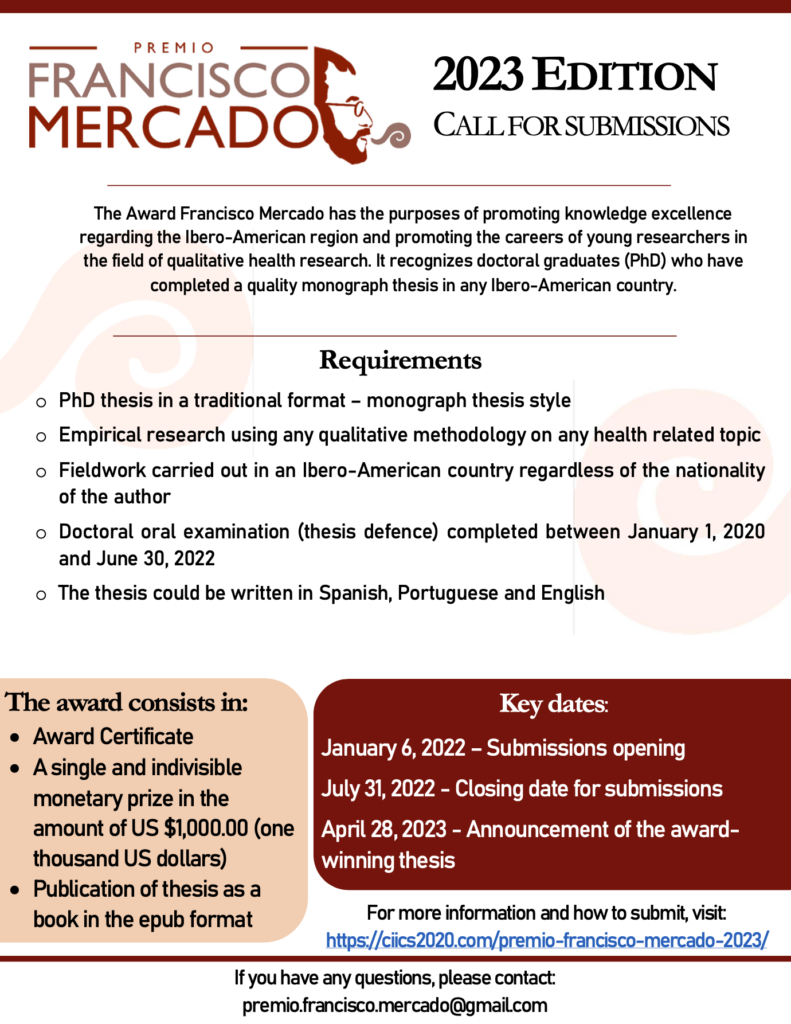
CALL FOR ABSTRACTS – Teaching for Transformation: Annual Conference+
Teaching for Transformation: Annual Conference+ (TforT:AC+) is a three day immersion in the education paradigms and practices needed for today’s health care work. TforT: AC+ involves keynote facilitated sessions, nominated emerging work (NEW), workshops, submitted short talks, roundtables, and space for open dialogue. TforT:AC+ will take place online, enabling an international reach.
Conference+
TforT:AC+ is more than a conference. Registration limited to foster a dialogic learning environment. Additionally, registrants will gain access to a private website of resources and activities for their ongoing use and an online community of support.
TforT:AC+ is part of a larger Teaching for Transformation Program that is jointly offered by the Centre for Faculty Development and the Centre for Interprofessional Education. For more information about TforT, click here.
We invite Short Talk abstracts on finished studies, works in progress, or innovations on the topics of transformative education, transformative learning, critical pedagogy, and more–within the context of health professions and health sciences education. Short Talks will be 10 minutes long with 5 minutes for questions.
Abstract Deadline: Monday February 14, 2022, 11:59pm EST.
Abstracts will be reviewed and a limited number invited for presentation.
Please submit your abstract here.
CALL FOR PAPERS: 38th Annual Qualitative Analysis Conference and Couch-Stone Symposium
“ANALYTIC SCHEMA AND GETTING CLOSE”
JUNE 22-24, 2022
Deadline: November 19, 2021
In 1985, Herbert Blumer sent a message to the Qualitatives conference, which was printed in the program that year. At a time when symbolic interactionists were side-lined as interpretivists interested only in the micro, he sent this cheering message as we embarked on a journey of exploring the macro through the micro, of unearthing generic social processes (Prus 1987).
I am impressed very much by what you have in mind. Your objectives are excellent and your guiding rules are very much in order. Basically what is at stake is the question of how to see, to study, and to analyze human group life. The answer . . . is to probe into human group life as it is lived, to get intimately close to it, and to develop analytic schema that reflect honestly its empirical character. In my opinion, the prevailing approaches in the social and psychological sciences do not do this successfully, chiefly because of an unwillingness to get close to what is going on and then a reliance on substituting guess work and untested images. . . I wish you the greatest of success in you undertaking!
As qualitative researchers, we are committed to “getting close.” As Gary Alan Fine advocates, we must turn to the micro to study the macro. As such, groups emerge as a “hinge,” mediating influence, contingencies, and constraints of the macro on the micro and vice versa. We can move beyond conversations, then, of the macro and the micro dichotomy by studying groups and, as Blumer suggests, developing analytic schema and uncovering Robert Prus’ generic social processes.
We invite papers in the spirit of Blumer’s message, as well as any qualitative research papers unrelated to the theme
We are pleased to announce that Dr. Gary Alan Fine, Northwestern University, will present the Keynote Address and we are pleased to feature further plenaries by Dr. Waverly Duck and Dr. Susie Scott.
Abstracts can be submitted online at www.qualitatives.ca/submit-abstract. If you have any questions, please contact us at thequalitatives@gmail.com.
Call for Papers: Qualitative Research in Sport, Exercise and Health
Special Issue on Risk, Socio-materiality, and Inequality in Sport, Exercise, and Health
The dominant approach to risk in many exercise, sport, and health related fields (e.g., physical activity epidemiology, sport and exercise psychology) has been a technoscientific one. From a technoscientific approach, risk is understood as the probability and consequence of an adverse event that can be identified, measured, and managed via a range of quantitative methods deemed to capture objective risk ‘truths.’ Socio-culturally oriented sport and exercise scholars have taken an oppositional approach, arguing for the socially constructed nature of ‘risk.’ This approach critiques the mobilization of ‘risk’ as a means of organizing, monitoring, and regulating individuals and populations whilst simultaneously reducing health to individual behaviors and characteristics.
While an emphasis on the social aspects of risk has provided an important counterpoint to a technoscientific approach, it has made less room for examinations of materiality, instead leaving the work of ‘materializing’ risk (i.e., making it visible, comparable, and trackable) to technicians and scientists. Socio-cultural sport, health, and exercise scholars have paid little attention to the material, technoscientific practices of assembling the networks of human and technical (i.e., non- human) entities that constitute movement-related risks, or how materially-sustained relations of risk are maintained, challenged, and/or reassembled across time and space. While novel work is emerging, socio-culturally oriented research has also tended to undertheorize the material (bodily) expression of being more or less exposed to exercise or sport-related hazards (i.e., risks), including how inequalities get ‘under the skin’ and into the flesh (i.e., materialized in health disparities) and/or the bodily experiences of being ‘at risk.’
In this special issue, we seek theoretical, methodological, and empirical qualitative contributions that critically examine the socio-materiality of risk, especially in relation to inequality and social injustice. The goal of this thematic issue is to move beyond a risk dualism whereby the ‘social’ is the domain of socio-cultural scholars and the ‘material’ the realm of scientists. We are seeking novel contributions that are empirically rich, qualitatively informed, and theoretically grounded including those that have not appeared in mainstream qualitative exercise, sport, and health communities. We also invite the voices of traditionally and historically marginalized groups.
Possible topics include— but are not limited to—the following as they relate to exercise and/or sport:
- Inequality as an effect of materially-sustained risk networks (e.g., in racialized communities)
- The socio-materiality of risk using Science & Technology Studies (STS) perspectives and methodologies
- Arts-based methodologies to ‘materialize’ risk
- Phenomenology and/of risk
- Risk, embodiment, social justice, and health disparities
- Indigenous methodologies and world views of risk and embodiment
- Risk as a biosocial phenomenon
For more information and to submit a manuscript, visit the Taylor & Francis website.
2020 - 2021
Decolonizing Pathways Towards Integrative Healing in Social Work
On Friday, April 9, the Factor-Inwentash Faculty of Social Work presents a two-hour workshop on Decolonizing Pathways Towards Integrative Healing in Social Work, inspired by Michael Yellow Bird and Kris Clarke’s book of the same name. Featuring a dialogue with the authors and a panel discussion with grassroots community leaders, this workshop aims to create a space for social workers, and those interested in the field, to strengthen our knowledge and commitment to:
- Holding social work accountable for historic and ongoing complicity in colonial practices
- Learning from social movements and Indigenous resistance to colonial violence, and
- Creating pathways for knowledge that was closed by colonial systems to transform and decolonize social work theory and practice
Program
12:00 – 12:20pm: Opening song by Chris Wasler + Welcome & Introductions
12:20 – 1:00pm: Dialogue with the Authors: Kris Clarke and Michael Yellow Bird, authors of Decolonizing Pathways Towards Integrative Healing in Social Work
1:00 – 1:05: Body Break
1:05 – 1:50: Panel Discussion: Grassroots Leaders Engaged in Decolonizing Healing Practices. Featuring: Germaine Trudeau-Elliot, Lisa Robinson, Jeffrey McNeil Seymour, Ana Pano
1:50 – 2:00: Closing Reflections, “Journey Song” by Chris Wasler, and Thank Yous
Click here to register for this workshop.
New Journal: Social Science & Medicine – Qualitative Research in Health
Elsevier recently launched a new open access journal: Social Science and Medicine – Qualitative Research in Health. The Journal is open to interdisciplinary qualitative research – including both methodological and theoretical contributions – related to medical care, illness, disease, health, and wellbeing from around the world.
Elsevier will waive the Article Processing Fees for any submissions received before December 31, 2021, which are accepted for publication after peer review
Call for Proposals – International Society of Critical Health Psychology Conference
The call for proposals is now open for the International Society of Critical Health Psychology (ISCHP) conference, 2021. This is a hybrid online/offline conference with a main hub in Pōneke (Wellington) Aotearoa (New Zealand) and virtual satellite hubs in Brisbane, London, Santiago, and Guelph. The conference runs from August 22nd – 25th 2021 New Zealand Time.
The organizers welcome academic and non-academic submissions and across a range of formats, including:
- Oral presentation
- Symposium
- Pecha Kucha
- Poster
The themes are:
- Honouring Indigenous voices: De‑colonising perspectives and practices in health research
- Storying community strengths and agency
- Partnering for better health
- Innovating & advancing critical health psychology
The submission deadline is April 16th, 2021. Authors will be notified by May 14th, 2021. Early bird registration will close June 1st, 2021. Full guidelines are attached.
If you are interested in attending the conference and signing up to receive regular updates (including about registration), you are invited to register your interest. For more information about the conference, please visit the conference website.
20th Annual Thinking Qualitatively Virtual Conference
The re-imagined 20th Thinking Qualitatively Virtual Conference will be held world-wide July 5-9, 2021. The conference will include keynotes, workshops, concurrent sessions and poster by researchers worldwide, vetted and presented regionally by date. The conference will run live in different regions each day during normal working hours for that region.
Researchers across the world will be vetted by reviewers local to their region, to present in their region, but can also attend presentations internationally.
North America, July 5, 2021
Latin America, July 5, 2021
Scandinavia, July 6, 2021
England, Ireland, Scotland, Wales, July 6
Europe, July 7, 2021
Africa, July 7, 2021
Australia, New Zealand, Asia, July 8, 2021
Software Training, July 9, 2021
Rates to attend will be based on current World Bank definitions for high, high middle, low-middle, and low-income countries.
Abstract submission and registration will open by mid-February or sooner, but no later than March 1, 2021, so please check IIQM and UBCO TQ site https://tq-2021.ok.ubc.ca regularly for updates.
For further details, please contact conference chair Karin Olson at karin.olson@ubc.ca or TQ2021 Event Coordinator Julianna Barabas at julianna.barabas@ubc.ca.
Qualitative Research and Innovation Series
SAGE and NVivo recently announced the Qualitative Research and Innovation Series of webinars and podcasts. Intended for researchers of all experience levels and backgrounds, this series highlights qualitative research and data collection methods across the social sciences and showcases practical insights into both traditional and emerging qualitative research approaches.
Upcoming webinars include “Doing Qualitative Research in a Digital World”, “Getting Started With Qualitative-Focused Mixed Methods Research: 4 Essential Things To Know & Do”, and “Connecting for Collecting Data: Qualitative Research Online with Human Participants”.
Register and view the list of webinars here.
Call for Papers – Special Issue of Qualitative Inquiry
Ethics in Research-based theatre: Stories from the field
Research-based theatre (RBT) is an emerging methodology that integrates theatre and research, both as a means of inquiry and as a form of knowledge translation/exchange. To be effective, RBT requires stakeholders to work collaboratively and in ways that balance methodological and ethical rigour with the aesthetics that theatre requires. This special issue invites contributors to explore ethical challenges in doing RBT and, where possible, to identify actual or potential avenues for resolving or creatively circumventing such challenges.
Expressions of interest will be in the form of an abstract (250-300 words) due on or before October 1st, 2020. Please send the abstract (with full contact information for all authors) and/or any inquiries to: Dr. Susan Cox at susan.cox@ubc.ca.
2019 - 2020
Call for Proposals – 2020 University of Toronto Teaching and Learning Symposium
Deadline to submit extended: March 9th! This year’s Teaching & Learning Symposium – Teacher-as-Learner/Learner-as-Teacher – takes a broad approach to thinking about professional learning for instructors. We ask: what is professional development in teaching and learning and what does it look like in practice across our campuses? In particular, we are interested in the continuum between teachers and learners: learning about and engaging with effective teaching practices and how these subsequently impact student learning, how we incorporate peer and student feedback, modes of instruction that connect with and involve students on new and innovative levels, how the roles of teachers as learners, learners as teachers are being redefined, and how the diversity of the University of Toronto and our communities at large impact, define and transform teaching and learning both for our students and for us as educators. This University of Toronto tri-campus event (on May 27, 2020), hosted by the Centre for Teaching Support & Innovation and the Desautels Centre for Integrative Thinking, Rotman School of Management, is intended to stimulate discussion and the sharing of research, practices and experiences around teaching and learning. It is a cross-divisional forum that allows faculty, librarians and staff to celebrate their commitment to teaching and learning. Submit a proposal for:
- Interactive Workshop (1 hour)
- Inquiry into Teaching and Learning (20-minute papers, 2 per 1-hour session)
- Lightning Talk: Nifty Assignment or Teaching Strategy (15-minute talk, 3 per 1-hour session)
- Symposium-You (30 minutes, 2 per 1-hour session)
Submission deadline: March 9, 2020 – EXTENDED! Questions about the call for proposals or proposal submissions process can be directed to Kelly Gordon, Coordinator, Programming and Strategic Initiatives, CTSI at kelly.gordon@utoronto.ca. Learn more about the Call for Proposals.
Inbetween: Intersectional experiences of LGBTQ+ immigrants
March 4, 5-7pm, Public Health & Migration @ DLSPH
Brief Description: Seven digital stories of LGBTQ+ immigrants and their allies | Their expectations and lived experiences, from an intersectional perspective | The value of creating digital stories | A final Q&A session
Please register here: https://www.eventbrite.ca/e/digital-storytelling-intersectional-experiences-of-lgbtq-immigrants-tickets-95766858251?aff=ebdssbdestsearch
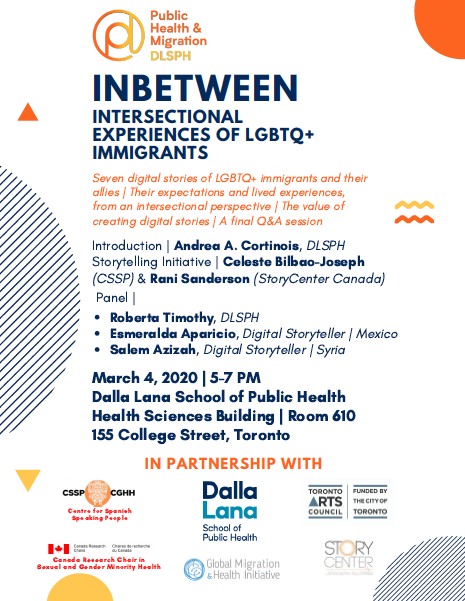
Canadian Sociological Association Conference- Call for Abstracts

The Canadian Sociological Association’s (CSA) Conference at Congress 2020, will be held at Western University, London, Ont. June 1-4, 2020. Abstracts are due Jan. 27th, 2020 (by 11:59pm PST).
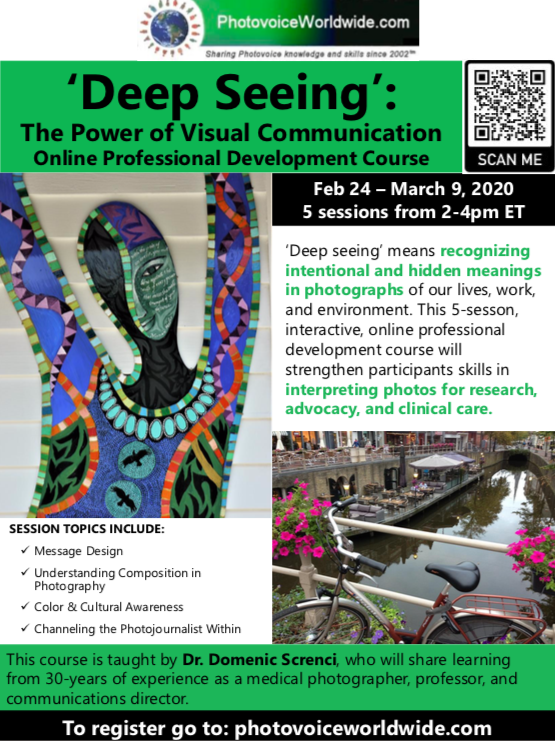
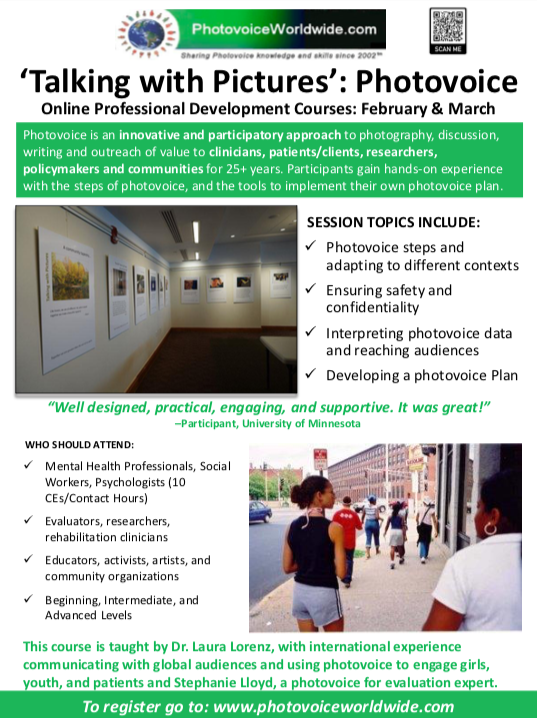
In Sickness and in Health (ISIH) International Conference- call for abstracts

https://public.xeria.es/ISIH8TH/en/register/registerpage/registroabstract
In Sickness and In Health is a conference dedicated to critical scholarship in health sciences. Theoretical, empirical and methodological contributions are welcome.
The extended deadline for abstract submission is January 20 (abstracts in Spanish or English will be accepted).
Cripping the Arts in Canada: Artist Panel
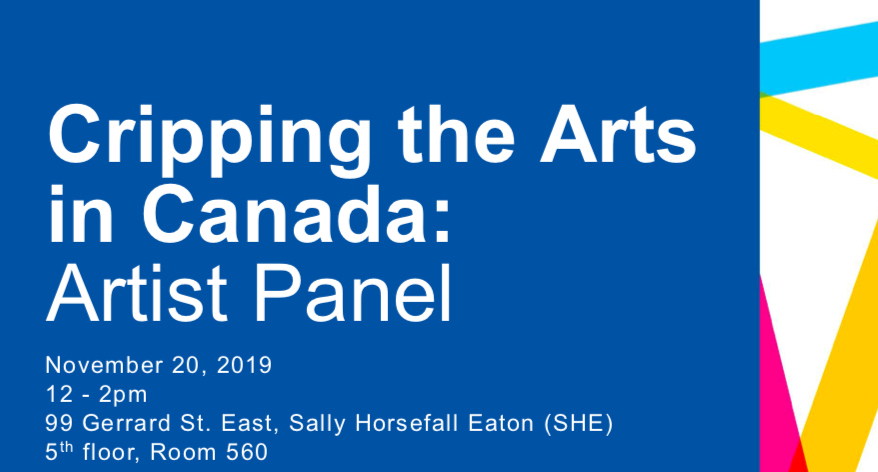
Join the School of Disability Studies at Ryerson University and the Cripping the Arts in Canada course for an artist panel. The panel will feature Yousef Kadoura, Rebecca Sweets, Vanessa Dion Fletcher and Alex Bulmer.
Date: November 20, 2019
Time: 12pm-2pm
Location: Sally Horsfall Eaton Centre, 5th floor room 560
Open to: Everyone
Yousef Kadoura was born in the midwestern United States and raised in Ottawa Ontario, he is a Lebanese Canadian actor, writer, producer, and curator as well as a right leg below knee amputee. Yousef is a graduate of the Acting (2017) program at the National Theatre School of Canada. Since moving to Toronto from Montreal in 2017, he has worked as the Curator in residence at Tangled Art + Disability co-curating the Flourishing series in 2018. He was also the producer and creator of the podcast series Walking the Space (2017) a three part podcast exploring disability in Canadian theatre. Yousef is also a founding company member of Other He/Arts a new performance collective which came together initially as a producing vehicle for the Yousef’s show, One Night, in Aluna Theatre’s Caminos festival (2019). As an artist Yousef seeks to draw from a plurality of experiences and disciplines to expand the boundaries of performance in pursuit of accessibility, presence and shared experience.
Rebecca Sweets is a Toronto-based multidisciplinary, mad + disability artist. Through tangible, performance, and interactive mediums, Sweets explores the enchantments and hindrances of digitality, cycling between intimacy, identity, and the imagination. She has worked with Akin Collective, Mammalian Diving Reflex and has had performances and works at Trinity Square Video, Gardiner Museum, Gladstone Hotel, and Margin of Eras Gallery. Most recently she co-founded and released PRUDEmag, a collaborative zine reclaiming the term “prude” as a celebration of autonomy and boundary-setting, a refusal of sex-necessary feminism, and a liberation in which one’s “no” is respected. Currently she is working on her first solo exhibition entitled LOVE MY DYSFUNCTIONS exhibiting at the Margin of Eras gallery in February 2020. You can find her at rebeccasweets.com.
Vanessa Dion Fletcher is a Lenape and Potawatomi neurodiverse Artist. She graduated from The School of the Art Institute of Chicago in 2016 with an MFA in performance, she has exhibited across Canada and the US, at Art Mur in Montreal, Eastern Edge Gallery Newfoundland, The Queer Arts Festival Vancouver, Satellite Art show Miami. Her work is in the Indigenous Art Centre, Joan Flasch Artist Book collection, Vtape and Seneca College. In 2019 Vanessa is supported by the City of Toronto Indigenous partnerships fund to be the Artist in Residence at OCAD University.
Alex Bulmer is an award winning writer, director, and actor. Originally from Canada, Alex Bulmer has worked internationally in theatre, film, radio and television for over 25 years. Alex has worked with numerous organizations including the BBC, CBC, Buddies in Bad Times Theatre, National Theatre of England,Nightwood Theatre, The National Arts Centre of Canada, Royal Court, Graeae Theatre Company, APAE Brazil, the London 2012 Olympics. She is the writer of the AMI award-winning BBC radio 4 adaptation of The Hunchback of Notre Dame, writer of SMUDGE, which earned two Best New Play nominations in Canada and was Time Out’s Critics’ Choice during its U.K. premiere, and co-writer of the BAFTA-nominated U.K. television series Cast Offs, a disability informed production featuring six lead disabled actors. She is co founder of Invisible Flash UK , Artistic Director of Cripping The Stage in association with The British Council Toronto , and co-Artistic Director of Common Boots Theatre in Canada. Alex was awarded Best Actress at the 2018 Moscow International Disability Film Festival, and appears as Lady Z in the upcoming Apple Television series See. She was recently named as one of the most influential disabled artists by UK’s Power Magazine.
Access Information:
The event location is wheelchair accessible. ASL (Christopher Desloges and Rogue as interpreters), live-captioning and attendant care will be provided. Attendees are asked to please refrain from wearing scents or fragrances. Nearest accessible TTC station is Dundas.
Livestream link: https://ryecast.ryerson.ca/72/Live/1861.aspx
What’s in a Word: Exploring the Multiple Meanings of Humanism in Contemporary Healthcare and Health Professions Education
Creating Space 10- 17-18 April 2020, Vancouver, British Columbia
Creating Space was launched in 2010 with a desire to “take the pulse of our shared work from multiple disciplines…as they intersect with health-care experiences in various settings”. In the years that have followed, the conference has annually brought together artists, writers, scholars, clinicians, activists, students and many others to consider the intersections of arts, humanities, and social science (AHSS) disciplines with medical sciences and health professions education. Ten years on, it is clear that that pulse is stronger than ever. From coast to coast to coast, ideas are circulating, dialogues are unfolding, and innovation and scholarship are changing health professions education. As perhaps the latest sign that the health humanities have arrived in force, the 2020 Canadian Conference on Medical Education’s (CCME) theme is “weaving humanism into medical education”. The timing could not be better; educating for humanism in the contemporary world offers a powerful reminder that the lives of others are inextricably bound up in our own. Putting the concept of humanism into productive practice, however, requires better exploration about how the term is used, what these meanings afford, and even what these definitions may (unintentionally) impair. For example, might humanism be:
- A “humane-ism”, a way by which we can educate for empathy towards patients and their illness experiences in the multiple landscapes of healthcare?
- A Renaissance value that needs to inform education and practice in order to confront the rise of antihumanistic practices in both early 21st century healthcare and the world writ large (Thibault 2019)?
- A critical approach that suggests that a medical education centred on biomedicine requires disruption in ways that allow for “making strange” the worlds of health and illness that we come to take for granted (Kumagai 2017)?
- A key to unlock deeper critique of persistent powerful discourses operant in health professions education that privilege certain voices and ways of being over others?
- An approach that is hard to reconcile with contemporary technologies that blur the lines between humans and the material world?
- A Eurocentric concept that may unknowingly reinforce the privileged position of that approach to knowledge and practice in contemporary health professions education?
These examples are not exhaustive. Rather, they are intended to open up conversation and dialogue around humanism in 2020, thicken the description of a potentially transformative concept, better understand its utility and its limitations, and look for ways by which we may better incorporate it into the clinical and educational practices of health care and health professions education.
To this end, Creating Space 10 is seeking submissions that strive to further dialogue in the following areas:
- The use of the health humanities to further current health professions education practices on humanism
- The use of the health humanities to critique current health professions education practices on humanism
- The overlaps and divergences of humanism as a concept in health professions education and practice
- Critique of mainstream conceptions of humanism in health professions education
As in the past, the Creating Space conference remains open to exciting off-topic work that does not strictly adhere to the above theme. As such, we also invite submissions in an open format. Further, students – both clinical and non-clinical – and residents are highly encouraged to submit their work. CS10 seeks students, residents, scholars, educationalists, artists and practitioners whose work involves the intersection of the arts, humanities, and social science (AHSS) disciplines and health professions
Proposal Guidelines: Please use the form here to prepare your abstract. Abstracts are to be no longer than 300 words (not including works cited)
To Submit a Proposal: All proposals must be submitted to the following address: cs10vancouver@gmail.com
Proposals are due no later than 23h59 (PST) January 15th, 2020. Acceptance of proposals will be confirmed by e-mail in mid-February 2020
For full details, please visit the website https://www.cahh.ca
